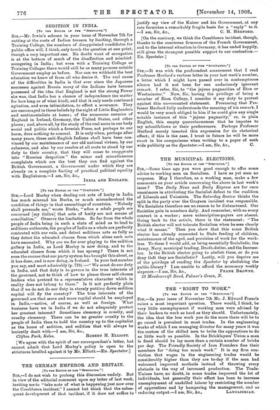THE " RIGHT TO WORK."
[TO THE EDITOR OF THE " SPECTATOR...1
SIR,—In your issue of November 7th Mr. J. Edward Francis raises a most important question. There would, I think, be very little unemployment if working men were advised by their leaders to work as hard as they should. Unfortunately, the idea that the less work you do the more there will be to go round is prevalent in most trades. In the engineering works of which I am managing director for many years it was the custom of the skilled men to bribe the apprentices to do as little work as possible. In the Bricklayers' Union a man is fined should he lay more than a certain number of bricks per day. The Friendly Society of Iron Founders fine their members for "doing too much work." It is my firm con- viction that wages in the engineering trades would be considerably higher than they are to-day if the men had welcomed improved methods instead of throwing every obstacle in the way of increased production. The Trade- Unions have, no doubt, in some trades improved the lot of individuals, but generally their effect has been to increase unemployment of unskilled labour by restricting the number of apprentices and by hampering the management, and so
reducing output.—I am, Sir, &c., LANCASTRIAN.










































 Previous page
Previous page